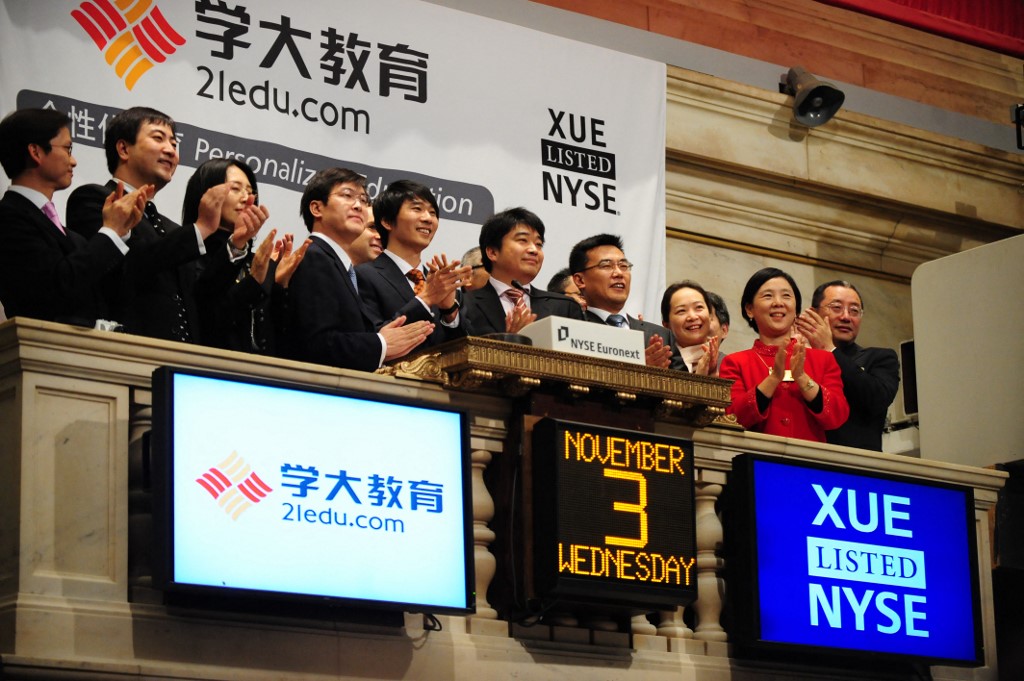China’s months-long regulatory crackdown on an array of private companies has unsettled tech upstarts as well as decades-old firms, ushering in a new, uncertain environment.
Top antitrust regulator the State Administration for Market Regulation (SAMR) issued sweeping draft rules on Tuesday governing online competition as the cabinet updated rules for operators of information infrastructure that experts say target data-rich firms.
Here are sectors facing tougher regulatory measures:
E-COMMERCE
Traditional e-commerce has been one of the biggest targets with a record fine of $2.75 billion in April for Alibaba over its “choose one from two” feature that bars vendors from selling on rival sites.
Smaller companies also faced fines over issues of consumer rights and labour.
In May, rival JD.com was fined 300,000 yuan ($46,000) over false information on food products.
In late July, the regulator ordered better protection for workers of food delivery firms.
Tuesday’s draft laws are widely expected to affect the sector by reining in fake reviews and inflated public metrics, while barring use of data or algorithms to hijack traffic or influence user choice.
LIVE-STREAMING
Barely a day goes by without some new regulatory move. And the latest news is hosts in China’s live-streaming industry were told on Wednesday (August 18) that they should speak Mandarin and dress appropriately when they market products online.
The country’s Commerce ministry gave this order as they look to tighten its oversight of the sector.
Live-streamed marketing has seen its popularity surge over the last two years among brands like L’Oreal, Nike, Dyson and online shoppers, and most Chinese e-commerce platforms now offer the option to purchase and sell products via live-streaming.
It became the target of scrutiny last year after some shoppers and brands accused some livestream hosts of misrepresenting products or faking sales numbers. That led to the cyberspace regulator to announce draft rules in November.
More detailed guidelines were published by the Ministry of Commerce on Wednesday and for the first time mentioned a preferred language. Mandarin is the official medium in China but there are also many dialects and ethnic minority languages in the country.
“It is better to use Mandarin during live-streaming,” it said in a section about how live-streamers were expected to behave.
The new rules, which are up for public review until Sept 2, also said live-streamers should dress in a way that is inoffensive to their audience, and carry an image reflecting the characteristics of the products or services they try to sell.
GAMING AND SOCIAL MEDIA
Regulators have yet to directly target gaming and social media firms, but fierce criticism from state media over issues from celebrity watching to video game addiction have spurred big share sell-offs, or changes by the companies.
Weibo Corp, which runs a Twitter-like service, dropped a ranking feature after the People’s Daily newspaper, backed by the ruling Chinese Communist Party, criticised celebrity hype by social media this month.
In August, the Economic Information Daily described online gaming as “spiritual opium”, generating a storm that wiped $60 billion off the market value of industry giant Tencent Holdings at one point.
Tencent later announced curbs on minors’ access to its most popular game, “Honor of Kings”.
EDUCATION
Publicly listed tutoring firms saw massive sell-offs after regulations last month barred private, for-profit tutoring companies from raising capital overseas among other limits.
Social media giant ByteDance laid off staff in its education unit, while online tutoring company VIPKid stopped lessons by foreigners.
ONLINE FINANCE
In November, shortly before what would have been a record share sale by Ant Group Co Ltd, draft rules by banking regulators set tighter controls on online lending, where the company was a giant player.
They also set limits on cross-provincial online loans and capped loans to individuals.
A day later, the central bank halted Ant Group’s IPO, and in April, the regulator ordered the separation of its payment and personal finance businesses.
RIDE-HAILING
In June, the Cyberspace Administration of China told top ride-hailing company Didi Chuxing to stop accepting new users, days after it listed on the New York Stock Exchange, a measure that knocked about a fifth off its share price.
Analysts and investors say the Didi measures have more to do with big data and overseas listings by Chinese firms than competitive practices. Draft rules ordered data-rich Chinese firms to run a security review before listing overseas.
And on August 18, a Ministry of Transport official said during a State Council briefing that a cap will be placed on the percentage that ride-hailing platforms can take from drivers’ fees. That is also likely to hit Didi Global‘s earnings.
BITCOIN
In May, three financial regulators widened curbs on cryptocurrency by barring its use for payment or settlement by banks and online firms, as well as exchanging it for fiat currencies and halting investments by fund managers.
Provincial governments’ later curbs on bitcoin mining unleashed a wave of shutdowns, with state-linked tabloid Global Times estimating short-term closures of 90%.
PROPERTY
In July, the housing ministry and seven regulators took aim at the property management sector with a notice that chipped more than a tenth off the CSI 300 Real Estate sub-index.
As the economy emerges from its 2020 coronavirus slump, authorities tightened curbs this year on real estate borrowing to prevent any asset bubble, setting caps for developers and banks.
Property developers like China Evergrande have massive debts, which are seen as a threat to the stability of the financial system, so the crackdown in this sector – and the deleveraging being enforced by the government is hardly a surprise.
WHAT’S NEXT?
Investors are watching healthcare closely after the State Council, or cabinet, urged lower prices of medicines and reforms in June.
Tech firms will also brace for a data security law that mandates risk assessments and reports to authorities, as well as a law to protect personal information that governs storage of user data.
ALSO SEE:
China Rebukes WeChat, Multiple Other Apps for Data Transfer Violations
China’s Private Tutoring Overhaul Stuns Online Education Industry























